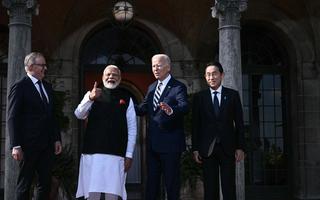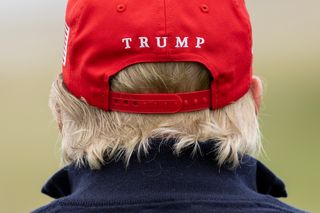When the Quad was first created in late 2004, it was an ad hoc response to an immediate crisis. The United States, Australia, Japan and India needed to quickly coordinate humanitarian relief across the Indian Ocean region in the wake of a sudden and unexpected earthquake and tsunami that killed more than 200,000 people.
Twenty years later, the four Quad nations have dramatically expanded the scope and ambition of the group, calling the Quad “more strategically aligned than ever” because it is delivering “enduring impact” as a “vital and enduring regional grouping that will buttress the Indo-Pacific for decades to come”. Yet this was not because of anything sudden or unexpected. Instead, its relevance across multiple presidents and prime ministers in the four countries can be attributed to something that has been growing for some time – China’s aggressively revisionist behaviour.
Yet as much as China has catalysed and revitalized this grouping, questions about the viability and survival of the Quad persist. These questions are only heighted given the domestic constraints currently faced by the four Quad leaders, India’s continued ties with Russia in the wake of its invasion of Ukraine, and persistent questions about the future of US international leadership.
The structural pressure for the Quad’s endurance – along with other multilateral and mini-lateral efforts that seek to counterbalance China – will persist as long as China’s behaviour does. Yet it should not be overlooked that the Quad’s nations will be the ones to ultimately decide just how ambitious and practical they are willing to make this grouping.
Quad leaders are weaker than they were in 2017
The four democratic leaders currently leading the Quad countries are undeniably weaker domestically than they or their predecessors were when the Quad was revived in 2017 by the governments of Japan’s Shinzo Abe, the United States’ Donald Trump, Australia’s Scott Morrison, and India’s Narendra Modi.
Japanese Prime Minister Shinzo Abe championed the Quad and a multi-polar regional strategy more than any other world leader, yet his departure and subsequent assassination left a void of leadership that remains unfilled to this day. His immediate successor, Fumio Kishida, left office under exceedingly low approval ratings while his successor, Shigeru Ishiba, will have to content with his Liberal Democratic Party recently losing its parliamentary majority for the first time in 15 years.
Indian Prime Minister Narendra Modi remains in office for a rare third term but after facing one electoral success after another for much of his political career – including increasing numbers of seats for his Bharatiya Janata Party over Modi’s prior two elections – India’s June 2024 national elections saw his party decrease its number of seats and lose its outright majority in Parliament.
Australian Prime Minister Scott Morrison and his Coalition government ended up losing the May 2022 election to a Labor government now led by Prime Minister Anthony Albanese. But Morrison’s successor now faces the prospect of being a one term prime minister or leading a minority government in 2025 amid increasingly negative approval ratings, with one recent public opinion poll finding Albanese to be the weakest Prime Minister in decades.
In the United States, President Trump won back the White House in November 2024, but compared to the last time he took office in 2017, his Republican Party’s majority in the House of Representatives will be significantly smaller in 2025 (fewer than 6 seats) compared to the last time he took office (40 seats or more). Furthermore, Trump won the election and popular vote with an even more strident and detailed “American First” platform, leading to concern about the United States isolating itself away from allies, partners, and the world at large.
Persistant public support for the US-backed Quad
Public polling in the Quad countries continues to find much of the domestic leadership consistently under water or at least less popular than they were in 2017. At the same time, however, public polling within Quad nations finds consistency in other key areas that have persevered regardless of domestic political dynamics – most notably support within Quad countries for continued ties with other members and persistent scepticism of China.
China’s military buildup, naval aggression across the Indo-Pacific, economic coercion, wolf warrior diplomacy and violent border clashes has significantly shifted the strategic calculations of the region for the foreseeable future.
As the world’s largest economy and most powerful military, no individual country is more integral to the Quad than the United States. Yet even on this topic, the incoming Trump administration may not have been the preferred 2024 presidential candidate across the other Quad members but polling continues to find increased levels of support for US alliances and partnerships in the three other Quad countries despite changes in US political leadership.
Given these persistent trends and structural dynamics, it should come as no surprise that Prime Minister Albanese decided to join a Quad Leaders’ Summit mere hours after being elected in May 2022. As much as many leaders face domestic constraints – including criticism of prioritizing foreign travel over domestic challenges – the Prime Minister deemed the Quad meeting too important to be skipped.
Individual leaders of the Quad nations may face domestic challenges and have reservations about individual Quad leaders. Yet China’s destabilising behaviour and the relative speed and ease of mini-lateralism compared with the alternative, ultimately leaves Quad members few choices but to persist in counterbalancing strategies to deter Beijing’s revisionist agenda.
Where to from here?
While the catalyst and rationale for the Quad will likely remain for the foreseeable future, the Quad countries have agency to decide its agenda and speed. In other words, the four Quad nations will determine just how ambitious they are willing to make their grouping.
The security dimensions in the Indo-Pacific are undeniable and consistently pushing the Quad countries in one direction: towards closer defence cooperation and collaboration.
This defence cooperation and collaboration can most visibly be seen in the increasing number of military exercises featuring the Quad members as well as the increasing levels of defence ties among four Quad countries. While the respective foreign ministries of the four members will likely continue to avoid calling the Quad a security arrangement, China’s unprecedented security challenges have propelled security cooperation and collaboration to levels that few would have predicted only a few years ago.
The Quad is unlikely to become a formal security alliance. However, efforts that are similar but just short of that – particularly in areas like defence interoperability and sharing advanced technologies – are now more likely than ever.
Closer economic collaboration among Quad countries is often discussed – both on a bilateral basis as well as in multilateral efforts like the Indo-Pacific Economic Framework – but achieving lasting impact in this area is particularly challenging given domestic concerns that constrain behaviour more than defence cooperation.
The Quad is unlikely to become a formal free trade agreement. However, efforts that are similar but just short of that – particularly in areas like supply chains and energy security – are now more likely than ever.
The increasing levels of strategic alignment across to many areas makes clear that Quad efforts need not be limited to the Quad leaders. Individual secondments and exchanges among the Quad governments, for example, could become a regular and integral component of Quad cooperation amongst diverse government departments.
The lack of a formal Quad security treaty or trade agreement makes the grouping appear inadequate to some. Yet by other measures – including four democratic yet diverse nations persevering through domestic challenges to collaborate on some of the most defining challenges of the 21st century – the Quad may ultimately become one of the most consequential groupings of our era. It’s ultimately up to the Quad nations whether they heed that urgency and make it that.









